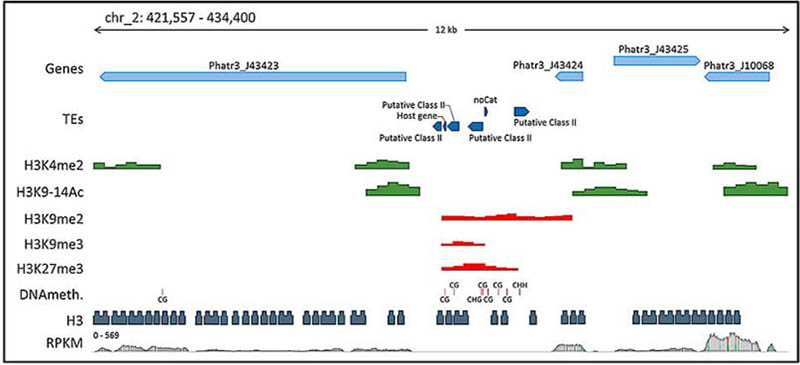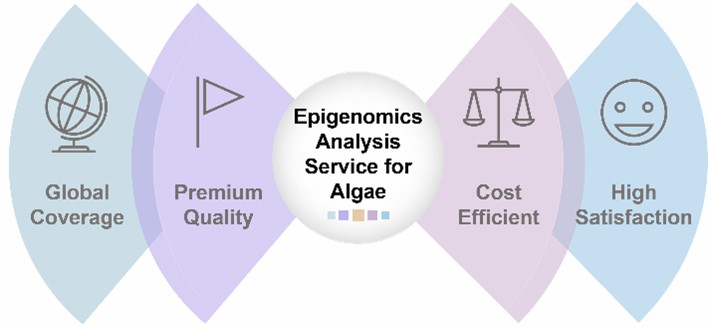Epigenomics Analysis Service for Algae
Epigenomics is the study of a set of epigenetic modifications of cellular genetic material. Epigenetic modifications are reversible modifications of cellular DNA or histones that can affect gene expression without altering the DNA sequence.
As an integrated and comprehensive CRO, Lifeasible can provide specialized epigenomics analysis services for algae through the study of DNA methylation and histone modifications.
Introduction to Epigenomics
Epigenetic modifications are reversible modifications of cellular DNA or histones that can affect gene expression without altering the DNA sequence. Epigenome maintenance is an ongoing process that plays an important role in the stability of the eukaryotic genome by participating in key biological mechanisms such as DNA repair.
DNA Methylation
When DNA methylation occurs in the promoter region, the transcription start site, it has the effect of repressing gene expression, in contrast to the promoter regions associated with actively expressed genes, which are mostly unmethylated promoters.
Histone Modification
Histones are the most common type of protein found in chromatin and function to hold DNA together. The positive charge on histones helps them bind to negatively charged DNA. The modification of histones mainly includes methylation, acetylation, phosphorylation, ADP-ribosylation, and ubiquitination.
Histone modification and DNA methylation occur together, determining whether the chromatin state is repressed or active, resulting in the expression or repression of genes and transcribable elements.
Epigenetic Studies of Algae
Epigenetic studies on algae have mainly focused on model organisms that concentrate algae.
Methylation in algae is distinctly different from DNA methylation levels in mammals and plants. For example, DNA methylation in marine diatom Phaeodactylum tricornutum is low, with about 5% global methylation and only 3.3% gene methylation, which is lower than in mammals and plants such as Arabidopsis and rice, where more than 30% of genes are methylated.
By examining post-translational modifications of Phaeodactylum tricornutum histones, genome-wide mapping of its key post-translational modifications (PTMs) reveals a conserved histone code that is more similar to animals than plants.
 Fig.1 Chromatin features in Phaeodactylum tricornutum. (Tirichine, L., Rastogi, A., & Bowler, C., 2017, Current opinion in plant biology)
Fig.1 Chromatin features in Phaeodactylum tricornutum. (Tirichine, L., Rastogi, A., & Bowler, C., 2017, Current opinion in plant biology)
Our Services
Epigenetic analysis of algae can systematically elucidate the epigenetic regulatory mechanisms and molecular regulatory networks of algal growth processes, which is conducive to the mining of important genetic resources for application in practice.
As a professional algae research and analysis company, Lifeasible has extensive experience in systematically and comprehensively analyzing the epigenomics characteristics of different algal strains.
DNA Methylation Detection Services
We offer a variety of DNA methylation assays, which are divided into 3 main categories. These include genomic methylation content analysis, candidate gene methylation analysis, as well as genomic level DNA methylation pattern and methylation profiling analysis.
| Genomic Methylation Content Analysis |
|
| Candidate Gene Methylation Analysis |
|
| Genomic Level DNA Methylation Pattern and Methylation Profiling Analysis |
|
Histone Modification Detection Services
We provide a professional histone modification detection platform that can quantify the overall level of histone modifications and detect the modifications of histones in the genome and their location in the genome.
- Protein Immunoblotting (WB)
- enzyme-linked immunoassay (ELISA)
- Mass Spectrometry (MS)
- Immunocytochemistry (ICC)
- Chromatin immunoprecipitation (ChIP)
Why Choose Us

As a global CRO company, Lifeasible provide professional and reliable epigenomics analysis services for algae to our clients worldwide. We have experienced teams to support efficient, rapid, and reliable epigenomics analysis with premium quality and high satisfaction. Please contact us for more information.
Reference
- Tirichine, L., Rastogi, A., & Bowler, C. (2017). Recent progress in diatom genomics and epigenomics. Current opinion in plant biology, 36, 46-55.
Our services are for research use only and not for any clinical use.